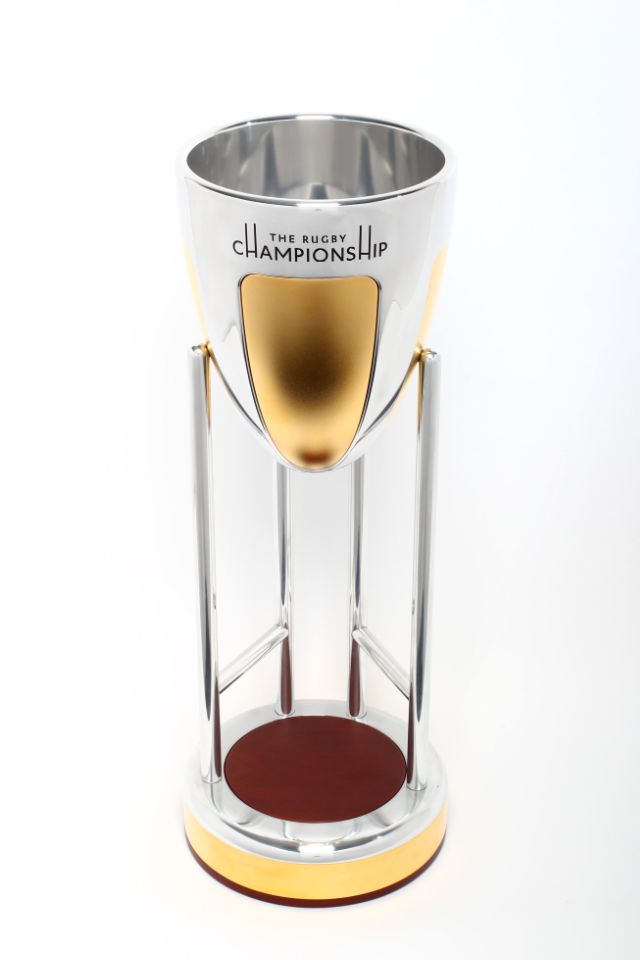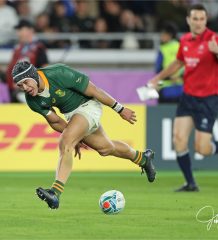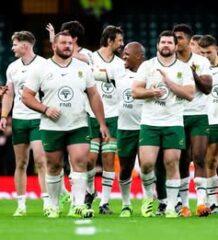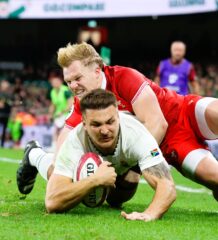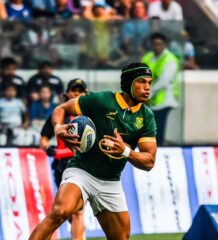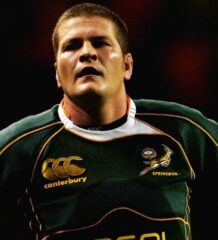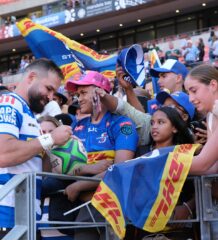10 Day Countdown begins to The Rugby Championship
First, second, third and eighth ranked nations in world rugby participating
On 18 August 2012 rugby history will have an exciting new chapter added with the first matches in the inaugural year of The Rugby Championship, the evolution of a Tri-Nations tournament that was first contested in 1996.
Over 16 years three nations that consistently remained in the top-three of the world, with combined six World Cups to their names, have battled it out in what was by virtue of the team’s rankings the toughest rugby competition in the world.
In 2012, Argentina will become the fourth nation to participate in the Southern Hemisphere’s preeminent international tournament. This adds a travel leg to South America, and in the past the All Blacks, Springboks and Wallabies teams have found how tough it is to play against the Pumas in their own backyard.
SANZAR CEO Greg Peters said anticipation was building for The Rugby Championship.
“With the Pumas entering The Rugby Championship, they join the top-three teams in the world which adds a completely new dimension to what has been a fantastic tournament over the past 16 years.” Peters said.
“For many years the Pumas have sought the chance to compete in a regular international Tournament and their third placed finish at the 2007 Rugby World Cup has been backed up by multiple wins against
France, England, Scotland and Italy over recent seasons.”
“Now they will play against the ‘best of the best’ joining an elite group that has not only claimed six Rugby World Cups, but have compelling winning records against all of their Northern Hemisphere rivals.”
Mendoza, La Plata and Rosario will make their tournament debuts and enter the history books as the first three Argentinean locations to host matches in The Rugby Championship. Interest is high in Argentina with the All Blacks match at La Plata sold out some time ago. The Pumas will visit Cape Town, Wellington and the Gold Coast in their away matches.
All four rugby nations were in action over the historic June international test series, which saw Super Rugby take a break for the first time in its history.
Reigning Tri-Nations champions the Wallabies suffered a shock 6-9 defeat to Scotland in their first match over June, but accounted for Six Nations Grand Slam champions Wales 3-0 over their test series
(27-19 Brisbane, 25-23 Melbourne, 20-19 Sydney).
The World Champion All Blacks played their first match since winning the Rugby World Cup over France in October, and defeated Ireland 3-0 despite the visitors threatening an upset in the second test
(42-10 Auckland, 22-19 Christchurch, 60-0 Hamilton).
The Springboks hosted England and won 2-0 (22-17 Durban, 36-27 Johannesburg, 14-14 Port Elizabeth).
The Pumas hosted Italy and France, and won two of their three tests 2-1 (37-22 San Juan v Italy, 23-20 v France in Cordoba, 49-10 v France in Tucuman).
While there were some close results, Peters said the results during the June series underlined how tough The Rugby Championship will be.
“With a 10-2 ledger with one draw between South and North over the three-week period, the standing of The Rugby Championship teams was further confirmed, and the winner of the inaugural tournament
will certainly have to fight to earn the coveted trophy.”
TRI-NATIONS REVIEW – 16 YEARS HISTORY OF THE SPRINGBOKS
By SANZAR
In the second of sanzarrugby.com’s three-part series, we take a look at the Springboks, who took part in the Southern Hemisphere’s premier international competition just five years after being readmitted to international competition.
Commencing the Tri-Nations in 1996 if there was to be a favourite (world rankings were not introduced by the International Rugby Board until 2003), it would have been South Africa, entering the inaugural competition as newly crowned World Champions.
The Springboks over the 16-year history of the Tri-Nations have the third best record of the three nations, winning 28 tests, losing 43 while drawing one.
This inconsistency has clearly rankled the proud rugby nation, as since the tournament began, South Africa has seen six coaches come and go, with current boss Peter de Villiers the seventh since 1996 – only Wales as a major test power have equaled this.
Yet when it has all come together the Springboks have been able to proudly toast their status as not only Tri-Nations champions on three occasions, but even in their ‘off’ years they have managed to pull off some remarkable results.
The Tri-Nations has seen South Africa put more points on the All Blacks (46) and Wallabies (61) than any other rugby team in history, while they hold the record for the biggest Test victory over Australia.
But we will look at that a bit later…
Running alongside the Tri-Nations are two trophies, with contests between South Africa and New Zealand (the Freedom Cup) and fixtures featuring South Africa and Australia (the Mandela Challenge Plate).
The Springboks haven’t held the Plate for two years, having won it in 2002, 2005 and 2009. They looked like winning it last season, courtesy of a ‘series-leveling’ 44-31 win in Pretoria (the Wallabies won 30-13 in Brisbane), but despite having all but claimed the third test, a stunning final minute Kurtley Beale conversion in Bloemfontein gave Australia the honours 41-39.
The Freedom Cup was first contested in 2004, with the Springboks winning the one-off fixture, while in 2006 the All Blacks claimed the trophy, but the 21-20 South Africa win in Rustenburg saw it incorrectly presented to captain John Smit (the All Blacks had won the first two tests that year in Wellington and Pretoria).
Overall the Springboks have won the Freedom Cup twice, in 2004 and 2009.
Highest Tri-Nations points scorers
210 – Percy Montgomery (4 tries, 26 conversions, 43 penalties, 3 drop goals)
198 – Morne Steyn (1 try, 17 conversions, 49 penalties, 4 drop goals
94 – Braam van Straaten (five conversions, 28 penalties)
Most tries scored
9 – Jaque Fourie
7 – Breyton Paulse, Bryan Habana
6 – Fourie du Preez, Jean de Villiers, Marius Joubert
First Tri-Nations title – 1998
Despite winning the World Cup in 1995, the following two years were widely considered to be ‘crisis’ campaigns for the Springboks, with only two wins coming from their first eight Tri-Nations Test matches, and among other reasons, were seen as contributing reasons for back-to-back sackings of coaches Andre Markgraaff and Carel du Plessis.
However 1998 would be the ushering of a new dawn for Springbok rugby, as Nick Mallet was appointed coach, and by the time that year’s Tri-Nations tournament commenced, the South Africans had won nine straight Test matches under the former False Bay and Boland Cavaliers mentor.
A tight 14-13 win over the Wallabies in Perth (with the scores tied 8-8 at halftime), opened the Springboks battle for a first title. They then followed this up with a convincing 13-3 win over the All Blacks in Wellington
In Durban, the All Blacks led the Boks 17-5 at halftime, before a stunning second half revival resulted in a 24-23 win for the Springboks.
This was followed by a 29-15 win over the Wallabies in Johannesburg.
Mallett would lead the Springboks to a record 17 consecutive Test match victories, although that record and their maiden Tri-Nations title was bittersweet, as the Republic’s rugby family mourned the loss of World Cup winning coach Kitch Christie, who tragically passed away on April 22, 1998.
Most memorable title – 2009
The year after winning the World Cup in 2007, the Springboks had a solid campaign, winning nine of their 13 Test matches, although they came third in the 2008 Tri-Nations, while that season’s winners – the All Blacks – seemed intent on taking revenge for another failed World Cup tilt in France, winning 13 of their 15 internationals.
However 2009 saw the fabled British and Irish Lions tour South Africa, and a hard fought 2-1 series success saw them suitably battle hardened for the Tri-Nations tournament.
The All Blacks defeated the Wallabies 22-16 to open their title defence, prior to heading off to the Republic for back-to-back Test matches in Bloemfontein and Durban.
Winning the first Test 28-19 was a landmark occasion for John Smit, who equaled Australia’s George Gregan and England’s Will Carling as the most capped Test captain, leading his country 59 times.
The following week saw Smit take the record as the most capped captain of all time (a record he still holds today), but the 31-19 win over the All Blacks saw Morne Steyn enter the history books.
Not only was it the most points scored by an individual in a Tri-Nations Test (eclipsing the mark of 29 set by Andrew Mehrtens in 1999), but was the all-time Test record for most points by a player who was responsible for all of his team’s scoring.
The Springboks completed their home leg with a 29-17 win in Cape Town over Australia.
Their away leg saw them smash the Wallabies 32-25 in Perth, with only two tries in the last five minutes to the hosts giving the score line some respectability.
Losing to Australia 21-6 in Brisbane meant that victory over the All Blacks in Hamilton was non-negotiable to claim the title, and the task was made more difficult with the return of star flyhalf Daniel Carter.
Despite scoring two tries a piece, the All Blacks were powerless against the kicking prowess of the Springboks, who won 32-29 – leading to a rare 3-0 sweep of the South African’s greatest rivals.
Francois Steyn kicked three penalties in the opening 40 minutes from his own half, believed to be the first time in history a player had achieved such a feat, while the sniper like boot of Morne Steyn led to him becoming the highest individual point’s scorer in a single Tri-Nations season, scoring 95 points.
The year it all went wrong – 2003
In a World Cup year it is hard not to go past the distinguished statistic that the Springboks have finished third in the Tri-Nations in 1999, 2003, 2007, and again this year (an omen perhaps of a third global title?).
However despite these results, the Springboks have managed to win at least one Test match in every Tri-Nations competition, a feat that the All Blacks and the Wallabies have not managed.
If a year had to be deemed an Annus horribilis it would have been in 2003, when the Springboks recorded their fifth straight ‘wooden spoon’ in the Tri-Nations.
The worst result in that tournament was day after Nelson Mandela’s Birthday, when the All Blacks arrived in Pretoria, and after demolishing the Springboks scrum and running riot via the backs, inflicted upon the South Africans a humiliating 52-16 loss.
Most significant match
In 2008 the Springboks came third in the tournament, but signed off in the best possible manner in Johannesburg despite losing their last three Test matches, including back-to-back losses in the Republic, together with an embarrassing 19-0 shutout by the All Blacks in Newlands.
The Wallabies were looking at recording their first consecutive victories on South African soil in 45 years, but they hadn’t backed on the hosts producing one of the most complete performances in their decorated history.
Wing Jongi Nokwe scored four tries en route to an eight-tries-to-one 53-8 victory, which was the Springboks largest ever win against the Wallabies.
The hammering still didn’t eradicate Australia’s chance to win the Tri-Nations, but with they couldn’t regroup and lost 28-24 to the All Blacks two weeks later in the tournament decider.
TRI-NATIONS REVIEW – 16 YEARS OF THE WALLABIES
By SANZAR
In the first of a three-part feature, sanzarugby.com looks at each of the Tri-Nations team’s 16-year history since the tournament began in 1996, and it is only fitting that we begin with the reigning champions, the Wallabies.
Australia has won 29 of their 72 Tri-Nations matches played, with 42 losses and one draw. While it may not be the most flattering record, Wallabies supporters will no doubt point out that wonderful cliché “you are only as good as your last game”, and that was a stunning 25-20 win over the All Blacks to claim their third title in 2011.
Their first Tri-Nations was won in 2000, and they went back-to-back with another success the following year.
Running alongside the Tri-Nations are trophies for Australia versus New Zealand clashes (Bledisloe Cup) and Australia versus South Africa fixtures (the Mandela Challenge Plate).
With just two Tests against their trans-Tasman rivals this year, the All Blacks 30-14 win at Eden Park ensured it finished 1-1 in 2011, despite Australia’s success in Brisbane, which means the holders of the Bledisloe retain the trophy.
The Wallabies won it in 1998, and held it for five years – their longest stretch in the Bledisloe’s 80-odd year history – but haven’t hoisted the Cup since 2002.
However Australia added the Mandela Plate to their Tri-Nations trophy, with a 2-0 success against the Springboks this year, winning 39-20 in Sydney and 14-9 in Durban.
They have held it for two years now, and have won it six times in the nine years the Plate has been contested.
Highest Tri-Nations points scorers
271 – Matt Burke (7 tries, 19 conversions, 65 penalties, 1 drop)
198 – Stirling Mortlock (10 tries, 21 conversions, 37 penalties)
193 – Matt Giteau (7 tries, 25 penalties, 33 conversions, 3 drop)
Most tries scored
10 – Stirling Mortlock, Lote Tuqiri
8 – Joe Roff
7 – Matt Burke, Matt Giteau, Chris Latham
First Tri-Nations title – 2000
The portents were set when the Wallabies defeated France 35-12 to win their second Rugby World Cup, and the stage was beckoning when then reigning Tri-Nations champions the All Blacks rolled into Sydney for the opening Test.
Exactly 109,874 spectators were on hand – the biggest ever rugby union crowd – to witness quite possibly one of the greatest Tests ever played, with the Wallabies coming back from 24-0 deficit (the All Blacks start was so remarkable Stadium Australia suffered a power cut in the first half!) after 10 minutes to draw level 24-24 at halftime.
It seemed as if Australia would claim victory, before the incomparable Jonah Lomu scored a try to win the match 39-35 in injury time.
The Wallabies would convincingly beat the Springboks 26-6 in Sydney, while a thriller in Johannesburg would see the South Africans down the All Blacks 46-40, which to this day remains the most points put on New Zealand.
The scene was set in Wellington, and it looked as if the All Blacks had done enough, leading 23-21 as the match went into injury time.
However two kicks to touch resulted in two lineout steals to the Wallabies, before All Blacks prop Craig Dowd infringed to give Australia a kick to win the match.
With regular kicker Stirling Mortlock off the field, captain John Eales calmly lined up the kick, striking it cleanly through the middle of the posts to give the Wallabies their first Tri-Nations championship.
Most memorable title – 2001
With the memories of their triumphant 2011 Tri-Nations still fresh, we take a look at their last title before their success this season, their second title which was the toughest for the Wallabies to win.
Their campaign didn’t begin ideally, losing in their first match against the Springboks in Pretoria, despite overcoming a 14-0 halftime deficit, failure to breach the home team’s try line resulted in a 20-15 loss.
A week earlier the All Blacks had managed to do what the Wallabies hadn’t, and beat the Springboks on their own turf, triumphing 12-3 at Newlands.
However the Wallabies would get their campaign back on track, recording their fifteenth (and most recent) win on New Zealand soil with a historic 23-15 win at Carisbrook, the first time Australia had won at the fabled “House of Pain”.
The champions elect were in control for most of the match, leading 10-5 at halftime, before closing out winners with a penalty try, while Matt Burke collected the rest of the team’s points with a try, two conversions and three penalties.
However things continued to go off script for the Wallabies when they scrapped to a 14-14 draw against the Springboks in Perth, while the All Blacks convincingly defeated the South Africans 26-15 at Eden Park.
The deciding match of the tournament would result in more heartbreak for the All Blacks, as for the second straight year the Wallabies would ‘snatch victory from the jaws of defeat’.
Australia held court in the first half, leading 19-6 at the break.
The All Blacks recovered, scoring 20 points to three in the second stanza, and with ten minutes to play it looked as if New Zealand would take the crown.
However Eales turned down three kickable penalties, stubbornly pushing for the try with kicks to touch each time.
It seemed as if the All Blacks defence would hold, but flyhalf Stephen Larkham threw a sublime inside ball to a rampaging Toutai Kefu, who scored to give the Wallabies a 29-26 win, and the title.
This result would complete the greatest period in Australian rugby history.
The year it all went wrong
In 2005 the Wallabies claimed the Tri-Nations wooden spoon, the first time since 1997 they had claimed that dubious honour.
The All Blacks, fresh off a whitewash of the British and Irish Lions, claimed the series, although in the early stages the Springboks had the early running with identical score line wins (22-16) over Australia in Pretoria and New Zealand in Cape Town.
The first Bledisloe Cup clash in Sydney started promisingly enough, courtesy of a marvelous Drew Mitchell try where he worked past no less than Rodney So’oialo, Dan Carter and Mils Muliaina to help the hosts establish a 13-0 lead.
Yet that only managed to click the All Blacks into gear, as they flexed their muscle at scrum time and orchestrated an attacking game of such fluency that one could have sworn the men in black were painting a masterpiece, such was their dominance in the backend of the game.
Thirty unanswered points gave the Wallabies a 30-13 defeat, while Bryan Habana’s two tries in Perth gave Australia an agonising 22-19 defeat to the Springboks.
The final match of the tournament saw the Wallabies stunned with the All Blacks racing out to a 20-0 lead at Eden Park, before a fight back ensued which saw the visitors close to within one point, before Doug Howlett’s third try of the game gave the home team the Tri-Nations.
The Wallabies finished that year winless, with a record low three bonus points, and would close that season with their worst test losing streak since 1969, which cost Eddie Jones his post.
Most significant match
By the time the All Blacks rolled into Sydney for the final match of the 1999 Tri-Nations, they had already claimed the title, courtesy of three thumping wins – 28-0 against the Springboks in Dunedin, 34-15 against the Wallabies in Auckland and 34-18 against South Africa in Pretoria.
Few would have predicted that the Wallabies would skip out to a remarkable 22-7 halftime lead, and go on to rout the All Black 28-7, which remains to this day the heaviest Test defeat in New Zealand rugby history.
Interestingly the 1999 tournament was the year of the penalty kick, with All Blacks number ten Andrew Mehrtens kicking 21 (including a record 9 at Eden Park) in four tests, while Wallabies fullback Matt Burke slotted over 13.
The rest they say, is history, as the All Blacks crashed out of the consequent World Cup, while the Wallabies went on to claim their second global title.
TRI-NATIONS REVIEW – 16 YEARS OF THE ALL BLACKS
By SANZAR
In our third and final feature in the series, we take a look at the Tri-Nations’ most successful team, New Zealand, which has won ten of the 16 championships on offer.
It has been a remarkable period for the All Blacks since 1996, winning more than three times as many crowns as the Springboks and Wallabies, a useful diversion when kiwis need to come up with a counter to the fact that their greatest rivals have won two World Cups each.
Overall this dominance is reflected in a ledger that has seen New Zealand win 50 of their 72 Tri-Nations Tests, with a 16-year aggregate of 1933-1410, a +523 point’s difference that is over 700 points clear of the Wallabies (-192) and Springboks (-349).
The All Blacks are the only team to clean sweep the Tri-Nations more than once – the Springboks achieved in it 1998 – having done so in 1996, 1997, 2003 and 2010.
Their 2003 season was the most successful of any team during a six-match format, while their 2010 triumph stands as the best campaign during a nine-match competition.
They are also the only team that has defended the Tri-Nations on more than one occasion – the Wallabies accomplished this in 2000/2001 – with the All Blacks doing this five times in 1996/1997, 2002/2003, 2005/2006, 2006/2007 and2007/2008. The latter three defences constitute the longest single reign for a Tri-Nations team, with the All Blacks having held it for four years.
Such has been the All Blacks’ tournament success that failure to win the Tri-Nations has often paralleled with their SANZAR contemporaries ‘golden runs’.
The Wallabies two wins at the dawn of the millennium capped off a period generally regarded as their finest ever era.
The Springboks success in 1998 was a welcome return to form for the then reigning World Champions, and Nick Mallet’s team at the time is still to this day rated as one of the finest South African sides. In 2004 their Tri-Nations success was seen by many as the building blocks of the current generation, while in 2009 that same generation ‘hit their peak’ winning the title off the back of a successful British and Irish Lions tour.
The two championships running alongside the Tri Nations for the All Blacks are the Bledisloe Cup (New Zealand versus Australia) and the Freedom Cup (New Zealand against South Africa).
The Bledisloe is the oldest running international competition in the Southern Hemisphere, and the All Blacks were holders when the Tri-Nations begun. In 1998 the Wallabies won it for just the eighth time since 1932, and went on to successfully defend it for five times – their greatest period of rule.
However in 2003 New Zealand won it back, and has not relinquished their hold on it since.
The Freedom Cup was first won by South Africa in 2004. In 2006 when it was contested for the second time the All Blacks won it, and held it for three years. The Springboks won it 3-0 in 2009, but New Zealand returned the favour the following year.
Highest Tri-Nations points scorer
461 – Dan Carter (6 tries, 61 conversions, 100 penalties, 3 drops) *
328 – Andrew Mehrtens (1 try, 34 conversions, 82 penalties, 3 drops)
153 – Carlos Spencer (3 tries, 21 conversions, 32 penalties)
Most tries scored
16 – Christian Cullen *
15 – Joe Rokocoko
13 – Doug Howlett
* Leading points and try scorer in Tri-Nations history
First Tri-Nations title – 1996
The All Blacks won the first two Tri-Nations titles in 1996 and 1997, with a team that many consider not only one of the finest vintages from New Zealand, but arguably one of the greatest of all time.
The very first Tri-Nations match was high on drama, as the Wallabies chose to turn their backs on the All Blacks haka and walk towards their goalposts and warm up. It was a vicious counterstrike by New Zealand, who made a mockery of the poor conditions at Athletic Park in Wellington to run out 43-6 victors – with their seven tries notched by some legends, with Jonah Lomu, Zinzan Brooke, Michael Jones, Jeff Wilson, Justin Marhsall and Cullen all getting on the score sheet.
The All Blacks clash with the Springboks in Christchurch was the first time the two finalists from the 1995 Rugby World Cup had played, and the Test didn’t disappoint, with Andre Joubert’s try (the only one of the Test) giving the visitors a 8-6 halftime lead, before the boot of Mehrtens allowed the All Blacks to run out 15-11 winners.
Another halftime deficit then had to be overcome by New Zealand in Brisbane, at the then named Lang Park, with the Wallabies leading 16-9 at the break, before second half tries by Frank Bunce and Marshall gave the All Blacks a 32-25 victory.
The final Tri-Nations Test in Newlands again saw the All Blacks come home the stronger, with Os du Randt and Japie Mulder scoring in the first 40 minutes to give the hosts a 15-6 lead, before the All Blacks second half unanswered tries by Glen Osbourne and Craig Dowd gave New Zealand the inaugural crown.
To cement their dominance, the All Blacks would remain in the Republic after the Tri-Nations for a three-test tour, and would win 2-1, their first series success on Springboks soil – and a victory that captain Sean Fitzpatrick would rate higher than their World Cup title in 1987.
Most memorable title – 2008
While the 2003 and 2010 seasons have gone down in Tri-Nations history as the most successful by any team, it was in 2008 where the All Blacks proved their class, a year after crashing out in their earliest ever World Cup exit (in the quarter-finals to France) while the Springboks were newly minted World Champions.
The opening match of that season’s Tri-Nations was a brutal affair, where the All Blacks – sans captain Richie McCaw – managed to beat a Springboks team that featured eight of their World Cup winners in the starting XV 19-8.
The ensuing match in Dunedin was another classic, but this time an inexperienced All Blacks team (six players had less than five caps, and only six had played more than 30 Tests) fell to the Springboks 30-28.
That match broke a ten-year Springbok winning drought in New Zealand, ended the All Blacks’ world-record 30-game winning streak at home, and gave South Africa their first win at Carisbrook for 87 years.
Two weeks later things went from bad to worse as the Wallabies put their highest winning score in history on the All Blacks, winning 34-19 in coach Robbie Deans first Test against his countrymen – and with McCaw still sitting in the stands, New Zealand sunk to back-to-back defeats for the first time in four years.
The All Blacks inspirational captain returned a week later, as New Zealand headed to their greatest fortress at Eden Park.
The Wallabies, who confidently talked themselves up prior to the Test, were stunned by a rampant home team, with Tony Woodcock scoring twice in four minutes in the first half, en route to a 39-10 win, Deans first loss as Australian coach.
Two weeks later the All Blacks continued to turn around their fortunes after losing two of their three first Tests in the series, heading to Newlands to win 19-0, the first time in the history of the two nation’s clashes that the Springboks had been held scoreless.
A stunned Cape Town crowd, who had cheered the Springboks and new Test match centurion Percy Montgomery onto the field, gave scattered heckles and jeers to their team when they left.
The final match of the Tri-Nations in Brisbane was the decider, courtesy of the Wallabies winning one from two in South Africa (27-15 in Durban). They lost the second match 53-8 in Johannesburg.
Despite an early Mils Muliaina try, the Wallabies were in control early in the second half, with tries from Adam Ashley-Cooper and James Horwill putting the Wallabies 17-7 ahead after 45 minutes.
The All Blacks hit back with a compelling 21 minute scoring spree that saw them record the same number of points – with converted tries to Tony Woodcock, Piri Weepu and Dan Carter.
Running out 28-24 victors, the All Blacks won their sixth Tri-Nations crown in seven years, despite the Springboks and Wallabies looking like title certainties after New Zealand’s two early competition losses.
The year it all went wrong – 1998
After winning consecutive titles in the first two year’s of the competition, many expected the third Tri-Nations in 1998 to be more of the same from the All Blacks, who still had most of their superstars on board after ruling world rugby for a couple of seasons.
Heavy wins against England (64-22 and 40-10) early that year reinforced this opinion.
The tournaments opening match saw the Wallabies beat the All Blacks for the first time in eight test matches, winning 24-16.
The Springboks then defeated the All Blacks in Wellington, the first time since 1981 the South Africans had won in New Zealand.
Australia then defeated the All Blacks 27-23, which was the first time in eight years that they had won in New Zealand, and the first time since 1958 they had won in Christchurch.
The All Blacks ‘tournament from hell’ was rounded off with a 24-23 loss to the Springboks in Durban, and to add insult to injury, the third Bledisloe Cup match in Sydney was won by the Wallabies 19-14.
Most significant match
In 2003 the All Blacks unveiled a game plan that in many respects set the tone for the current blueprint of the way rugby is played to this day.
Counter-attack was the vogue, playing with speed while players were encouraged to aggressively link up in support to produce a running game that was very much rugby at its most attractive.
Then All Blacks coach John Mitchell and assistant Robbie Deans pioneered this approach (Deans has used a similar style with the Wallabies), while Richie McCaw and Dan Carter were beginning their Test careers at the time.
This was encapsulated in Pretoria and Sydney.
The Springboks had just beaten the Wallabies 26-22 to open the 2003 Tri-Nations, but nothing could prepare them for an
All Blacks team that ran in seven tries and posted a 52-16 victory.
The All Blacks served up a similar thrashing to the Wallabies in their own backyard, winning 50-21.
However much to the chagrin of New Zealand supporters, the All Blacks had in many respects shown their aces too soon, as the Springboks (19-11) and Wallabies (21-17) closed the gap in the return matches – while ultimately Australia would have the last laugh at the World Cup later that year by shutting down the All Blacks expressive game plan with ease to win 22-10 in the semi-finals.
The Rugby Championship TICKETING INFORMATION
New Zealand matches
Saturday 25 August
All Blacks v Australia, 7.35pm
Eden Park, Auckland
Get your tickets from ticketmaster – 0800 111 999
Saturday 8 September
All Blacks v Argentina, 7.35pm
Westpac Stadium, Wellington
Get your tickets from ticketek- 0800 842 538
Saturday 15 September
All Blacks v South Africa, 7.35pm
Forsyth Barr Stadium, Dunedin
Get your tickets from ticketdirect – 0800 224 224
Australia matches
Saturday, 18 August, 2012
Qantas Wallabies v All Blacks
ANZ Stadium, Sydney
Tickets on Sale from Tuesday 17 July viawww.ticketek.com.au
Saturday, 8 September, 2012
Qantas Wallabies v Springboks
Patersons Stadium, Perth,
Tickets on Sale from Tuesday 7 August viawww.ticketmaster.com.au
Saturday, 15 September, 2012
Qantas Wallabies v Argentina
Skilled Park, Gold Coast,
Tickets on Sale from Tuesday 7 August viawww.ticketek.com.au
Argentina matches
(Please note the following links are in Spanish)
To access ticketing information go to: https://www.tuentrada.com/uar/Online/
25 August, 2012
Argentina v South Africa
Estadio Malvinas, Mendoza
To access ticketing go to: https://www.tuentrada.com/uar/Online/seatSelect.asp?
BOset::WSadmissions::admission::performance_id=F4824FD2-72AF-43F6-AA81-3D4E2C5CB0CB
29 September, 2012
Argentina v New Zealand
Estadio Ciudad de La Plata, La Plata
MATCH SOLD OUT
6 October, 2012
Argentina v Australia
Stadio Gigante de arroyito, Rosario
To access ticketing go to: https://www.tuentrada.com/uar/Online/default.asp?
doWork::WScontent::loadArticle=Load&BOparam::WScontent::loadArticle::article_id=2042F7D2-404A-
4EE7-976F-8F1568F99393
South Africa matches
18 August 2012,
Springboks v Argentina
Newlands Stadium, Cape Town
To access ticketing go to:
http://www.ticketpros.co.za/portal/web/index.php/event/6e1d4f1f-3b64-00f7-aa07-4ece085970ff
29 September 2012,
Springboks v Wallabies
Loftus Versfeld, Pretoria
To access ticketing go to:
http://www.ticketpros.co.za/portal/web/index.php/event/72e12e23-e490-3144-3973-4ecf9f4b03ec
6 October 2012,
Springboks v All Blacks
FNB Stadium, Soweto
To access ticketing go to:
www.computicket.com
Related Posts
« SANZAR unveils The Rugby Championship Trophy National Clubs Round-up No.22 – Old Selbornians end long Club Champs wait »


